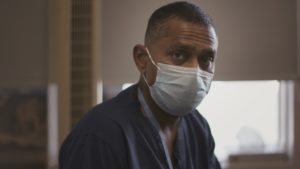Professor Basky Thilaganathan
Professor Basky Thilaganathan features across the three episodes of Baby Surgeons: Delivering Miracles.
As well as being Clinical Director of our Fetal Medicine Unit at St George’s, he’s also the Clinical Lead for the SAFE test NIPT laboratory and Clinical Director for Tommy’s National Centre for Maternity Improvement at the Royal College of Obstetricians and Gynaecologists.
Having joined St George’s in 1999, Professor Thilaganathan has led the Fetal Medicine Unit and played a key role in making Baby Surgeons: Delivering Miracles happen.
Here, we catch up with him…
How did you find filming for Baby Surgeons: Delivering Miracles?
We soon got used to it and began to ignore the presence of the cameras, though it felt a little strange at first. I was amazed at how many women agreed to be filmed – they are so strong and deserve credit for wanting to share their experiences.
What has been your favourite part of being involved with the series?
Seeing what women and parents are like when they are not on the ultrasound couch and seeing them with their children at home afterwards. It’s something that we very rarely get to see. Pre-pandemic, we would often have visits to the unit from mums who we’d treated that wanted us to meet their babies but obviously that isn’t happening at the moment so it was lovely to see families at home through the series.
Why did you want to be a part of this series?
I feel that people in general tend to hold strong feelings on this area of medicine without necessarily understanding what parents have to endure through no fault of their own. This series portrays their difficult journeys very clearly.
Throughout the series, it feels like team work is key in fetal medicine. Is that right?
Absolutely, everything we do is a team effort. We are not sole practitioners. The team – consultants, sonographers, midwives, clinical fellows and those from other departments such as anaesthetists, ENT and neonatal colleagues – all help us to achieve what we need to and we support one another when things don’t go to plan too. It’s incredibly important.
What made you want to get into this area of medicine?
Luck (opportunity) and timing would seem the best and most honest answer. I wasn’t born with a stethoscope around my neck. I’ve got no medics in my family. At a critical stage during my medical school training, I was exposed to obstetrics and spent a couple of months with Kypros Nicolaides. It was an eye opener to see what was happening in the very early days of fetal medicine. It had a huge influence on me deciding that this was the right career for me.
What would you say to someone who is interested in progressing into a similar career?
I hope it comes across in Baby Surgeons: Delivering Miracles that the doctors, midwives and sonographers are skilled as well as kind and caring people. You need all of those attributes, but in particular, you have to be kind and learn to take care of others – without that, it is a difficult field to succeed in.


